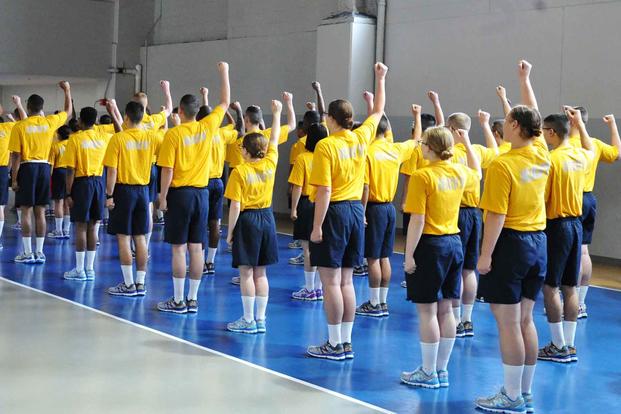The Navy is now offering recruits who do not meet fitness standards a chance to get in shape before boot camp in an effort to expand the pool of young Americans eligible to serve.
The Future Sailor Preparatory Course was highlighted by a service official at a congressional hearing Tuesday as one of the "innovative ways" the Navy is approaching recruitment challenges that have hit the military at large. The Navy program mirrors one launched last year by the Army that officials have touted as a success.
The Navy's physical fitness program launched at the beginning of this month, while a prep course for academic standards is expected to launch this summer, Erik Raven, the under secretary of the Navy, told the Senate Armed Services Committee on Tuesday.
Read Next: The Tragic, Conflicting and Now Politicized Tale of a US Sailor Sitting in a Japanese Prison
"Once accepted, we will work very closely with recruits to ensure their physical and mental readiness before they report to boot camp," Raven said.
The Armed Services Committee called Tuesday's hearing to discuss recruiting difficulties as every branch of the military struggles to hit its recruitment goals.
Last year, the Army failed to meet its recruiting goal by 15,000 soldiers. The other branches hit their goals, but had to get creative to do so, including boosting recruitment bonuses and dipping into their pools of delayed-entry applicants, which could make meeting future recruiting goals more difficult.
In the face of its recruiting struggles, the Army last summer launched its Future Soldier Preparatory Course at Fort Jackson, South Carolina, for recruits whose weight or scores on the military entrance exam are not up to standards. The program is seen as such a success Army officials are expanding the Fort Jackson program and bringing the courses to Fort Benning, Georgia.
As of February, the Army's academic course has seen 2,408 out of 3,094 trainees move on to basic combat training, Army Under Secretary Gabe Camarillo testified Tuesday. In the physical fitness course, 821 out of 956 trainees have graduated into basic combat training. Seven hundred seventy-seven students remain in both courses.
Like the Army program, recruits in the Navy's prep class will have 90 days to meet the service's body fat limits to move on to basic training, according to Raven's written testimony.
Few other details about the Navy's prep course were offered at the hearing, the bulk of which involved Democrats and Republicans sparring over whether diversity and inclusion initiatives help or hurt recruiting.
An admiral previously announced during a call with reporters in February that the prep classes were coming, but similarly did not provide more specifics.
The prep courses address one of the biggest issues military officials say they face in recruiting: Most young Americans are simply not eligible to serve because of obesity, lack of a high school diploma, minor criminal infractions, medical diagnoses and other factors. Officials estimate that only about 23% of young Americans are eligible to serve in the military.
The Future Sailor Preparatory Course is the Navy's latest move to expand the pool of eligible recruits, including accepting prospective sailors who score low on the military entrance exam. The Navy reached its 2022 recruiting goal by just 42 sailors and is now trying to recruit nearly 4,000 more sailors this year.
During the hearing, some Republicans, including committee ranking member Sen. Roger Wicker, R-Miss., expressed concern about the Navy lowering its standards for recruits, but Raven assured that job standards are unchanged.
"To be a machinist mate, to be a sailor, to be a fire controlman, you still have to meet the exact same standards as before," Raven said. "So we're trying to increase the pool, but the standards for performing the job are what is key and what we need to perform our mission. And we have not changed that."
-- Rebecca Kheel can be reached at rebecca.kheel@military.com. Follow her on Twitter @reporterkheel.
Related: Navy Swats 'Wokeness' Claims in Bid to Reach Older Americans Who Could Influence Recruiting















